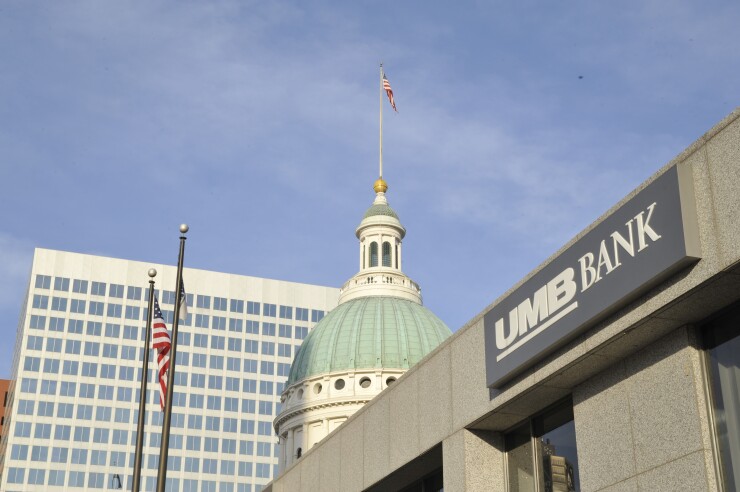
UMB Financial is taking several early steps toward its
The Kansas City, Missouri-based regional bank — whose assets are poised to grow by roughly 45% upon closure of the proposed $2 billion deal — has launched an integration program, submitted applications with regulators and conducted site visits and town hall meetings in which members of UMB's management team met with stakeholders throughout Heartland's five-state footprint.
The transaction, which was announced in April, is still expected to close during the first quarter of 2025, and a shareholder vote is scheduled to take place next week, UMB said Wednesday.
It is still targeting the fourth quarter of next year to conduct the systems and brand conversions.
During the bank's second-quarter earnings call,
"The addition of this high-quality franchise is a great fit from a strategic, financial and cultural perspective, and we look forward to capitalizing on the many opportunities we see at the combined company in 2025 and beyond," Kemper told analysts during the earnings call.
If it receives regulatory approval, the proposed deal would be the largest acquisition in the history of UMB, a $44.5 billion-asset company that currently operates in Missouri, Illinois, Colorado, Kansas, Oklahoma, Nebraska, Arizona and Texas. Post-closure, UMB would have assets of $64.5 billion, making it one of the top 40 largest commercial banks in the United States, and it would gain a presence in five more states — California, Minnesota, New Mexico, Iowa and Wisconsin.
The deal would also double the size of UMB's existing branch and ATM networks, and it would provide critical low-cost deposits to fund UMB's organic growth strategy, executives have said.
Denver-based Heartland, which
The proposed UMB-Heartland deal was accompanied by a capital raise.
At the time, Kemper said in an email that the capital raise would provide UMB with "ample dry powder and capital to fully support" the Heartland transaction and "further bolsters" the bank's capital ratios.
UMB reported a solid second quarter, with net income of $101.3 million and earnings per share of $2.07, topping the average estimate of $2.01 from analysts surveyed by FactSet Research Systems. Net interest income rose 8.6% year over year as a result of higher average loans, partially offset by higher interest costs, while fee income rose 5% compared to the same quarter last year amid increases in fund services, corporate trust and trust incomes.
Expenses were $249.1 million for the period, up 3.5% year over year, in part because of higher legal and consulting expenses related to the pending acquisition and higher bank card costs.
UMB Financial, Fulton Financial and Provident Financial Services have recently announced capital raises in connection with M&A deals. "They're setting a precedent," one consultant said.
Analysts didn't find too much to gripe about in the results.
In a research note, analyst Chris McGratty of Keefe, Bruyette & Woods wrote that it is "hard to poke holes" in UMB's results and said he remains bullish on the stock. Separately, analyst Jared Shaw at Barclays noted that UMB's credit quality "remains near the strongest" among its peers.
Indeed, net charge-offs for the quarter totaled $2.8 million, or 0.05% of average loans. Meanwhile, loans more than 90 days past due were $5.6 million, or 0.02% of average loans.
Average loans and average deposits increased 7.3% and 9.1%, respectively, from this time last year, the company reported. The loan growth stemmed from commercial real estate and construction draws on previously approved loans, Kemper said on the call.
Of the company's $23.8 billion loan portfolio, about $9.4 billion are commercial real estate loans, according to the company's second-quarter presentation slides. The largest chunk of the book is commercial and industrial loans, which topped $10 billion during the quarter.
Kemper was optimistic Wednesday about loan growth in the third quarter.
"As far as the pipeline goes, we actually see a very strong third quarter … and it's coming from across the board, all of our segments," Kemper said.






